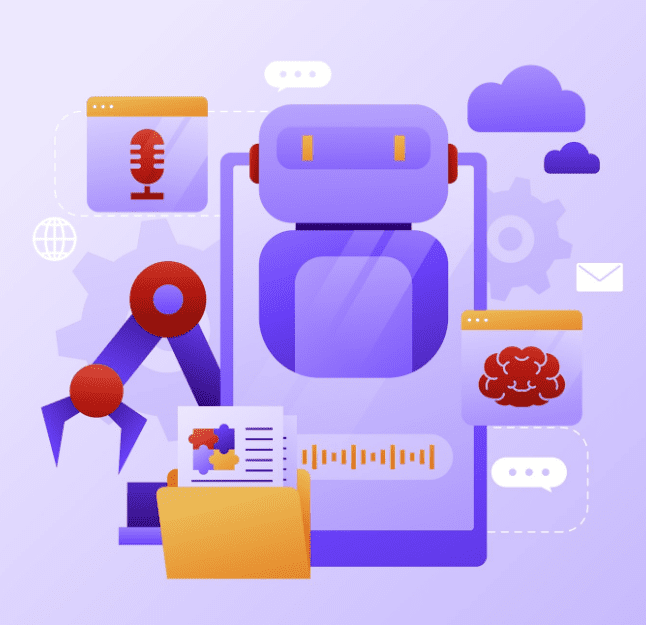In the fast-paced world of B2B marketing and sales, generating high-quality leads and engaging them meaningfully has become more complex than ever. Manual processes are no longer sufficient to keep up with the speed and volume of modern B2B demand generation. That’s where two powerful technologies are changing the game: B2B Lead Enrichment with AI and content automation tools.
Together, these tools help businesses not only find the right leads but also communicate with them at the right time, with the right message—at scale.

What Is B2B Lead Enrichment with AI?
B2B Lead Enrichment with AI refers to the use of artificial intelligence to enhance and complete prospect data from various sources. Rather than relying solely on forms, spreadsheets, or manual research, AI tools collect real-time data about leads—including firmographics (company size, industry, revenue), technographics (technology stack), behavioral signals (website visits, downloads), and social intelligence (LinkedIn data, job changes).
AI algorithms scrape and validate data across numerous public and proprietary databases. This provides businesses with:
- Accurate contact information
- Role-specific data
- Company-level attributes
- Buying intent signals
- Engagement patterns
This level of enrichment allows for hyper-targeted segmentation and prioritization of high-value leads.
For example, if your sales team receives a lead that only includes a name and company, AI can enrich that record with the prospect’s job title, business size, email, recent funding activity, and even whether they recently searched for a solution like yours.
With enriched leads, sales reps can tailor outreach more effectively and avoid wasting time on unqualified or outdated contacts.
Predictive Lead Scoring and Intent Detection
A key extension of lead enrichment is predictive lead scoring. Using AI, businesses can score leads based on conversion likelihood. These scores are derived from behavioral patterns, demographics, historical data, and third-party signals.
Advanced platforms use AI to detect buyer intent by monitoring digital footprints—such as search queries, ad interactions, and content downloads across the web. This allows marketers to target prospects before they even visit your site.
In essence, AI allows sales and marketing teams to “listen” to buying signals, automatically enrich that data, and prioritize engagement with leads that are actively in-market.oring, which uses historical data and behavior patterns to forecast the likelihood of a lead converting. This ensures that sales teams focus their efforts on leads with the highest potential ROI.
The Role of Content Automation Tools
Once leads are identified and enriched, the next challenge is to engage them effectively. That’s where content automation tools come into play. These tools use AI and machine learning to automate the creation, personalization, and distribution of content across various channels.
Some common types of content automation include:
- Email marketing automation
- Personalized landing pages
- Dynamic content on websites
- AI-generated blog posts or case studies
- Sales enablement content tailored to each prospect
By integrating content automation with lead enrichment data, businesses can tailor their messaging based on firmographic and behavioral insights. For example, if a lead works in a specific industry and has recently visited your pricing page, your automation system can send them a relevant case study and schedule a follow-up email—all without human intervention.
Combining Lead Enrichment with Content Automation
The true power lies in integrating both technologies. B2B Lead Enrichment with AI fuels content automation tools with data-rich insights. These insights are then used to tailor content dynamically to each stage of the buyer journey.
Here’s how it works in a typical B2B funnel:
- Lead Generation: AI gathers and enriches lead data from form submissions, webinars, or third-party platforms.
- Segmentation: Leads are categorized based on firmographics, behavior, and engagement.
- Scoring: AI predicts the likelihood of conversion and identifies sales-ready leads.
- Engagement: Content automation tools deliver personalized content based on lead attributes and behavior.
- Sales Handoff: High-scoring leads are passed to the sales team with full context, improving conversion chances.
This seamless system turns what used to be weeks of manual work into real-time, automated engagement—all personalized to the individual lead’s interests and needs.
Benefits for B2B Organizations
- Improved Lead Quality and Targeting:
AI ensures you work with clean, updated, and relevant lead data. This prevents time wasted on unqualified prospects. - Higher Engagement Through Personalization:
Content automation tools allow for consistent, personalized messaging that resonates with different buyer personas. - Reduced Manual Work:
Sales and marketing teams can focus on strategy and creativity while AI and automation handle research, segmentation, and campaign execution. - Faster Sales Cycles:
With enriched data and targeted content, leads move through the funnel faster and more efficiently. - Better ROI on Campaigns:
Precise targeting and automated nurturing increase conversion rates while lowering acquisition costs.
Real-World Use Case Example
A SaaS company offering enterprise CRM software implemented an AI-powered lead enrichment tool to analyze thousands of MQLs (marketing-qualified leads). They discovered that many of their forms were incomplete, and some contact data was outdated.
After implementing enrichment, they gained complete lead profiles including company size, annual revenue, and LinkedIn activity. Using this data, they segmented leads into three tiers and built automated content campaigns for each group.
The top tier received personalized outreach with case studies, demo invites, and custom ROI reports. Result? A 42% increase in lead-to-opportunity conversion and a 28% reduction in time-to-close.
The Strategic Advantage in 2025
As B2B buyer journeys become increasingly self-directed and digital-first, it’s critical for businesses to deliver value before the first sales call even happens. This means using AI to understand who your leads are and using automation tools to engage them intelligently.
Benefits include:
- Faster lead qualification and nurturing
- Reduced customer acquisition costs
- Improved alignment between marketing and sales
- Higher conversion rates through personalization
With B2B Lead Enrichment with AI and content automation tools, companies can turn raw contact data into sales-ready leads, and generic messages into tailored experiences—at scale.

Final Thoughts
In a competitive B2B landscape, speed, relevance, and intelligence are key. AI and automation provide these advantages, helping companies stay ahead in how they identify, engage, and convert leads. Investing in these technologies today is no longer optional—it’s essential for any business looking to scale efficiently in 2025 and beyond.
Check Out More Related Post :-
{ https://instantguestpost.blog/?p=10439 }


